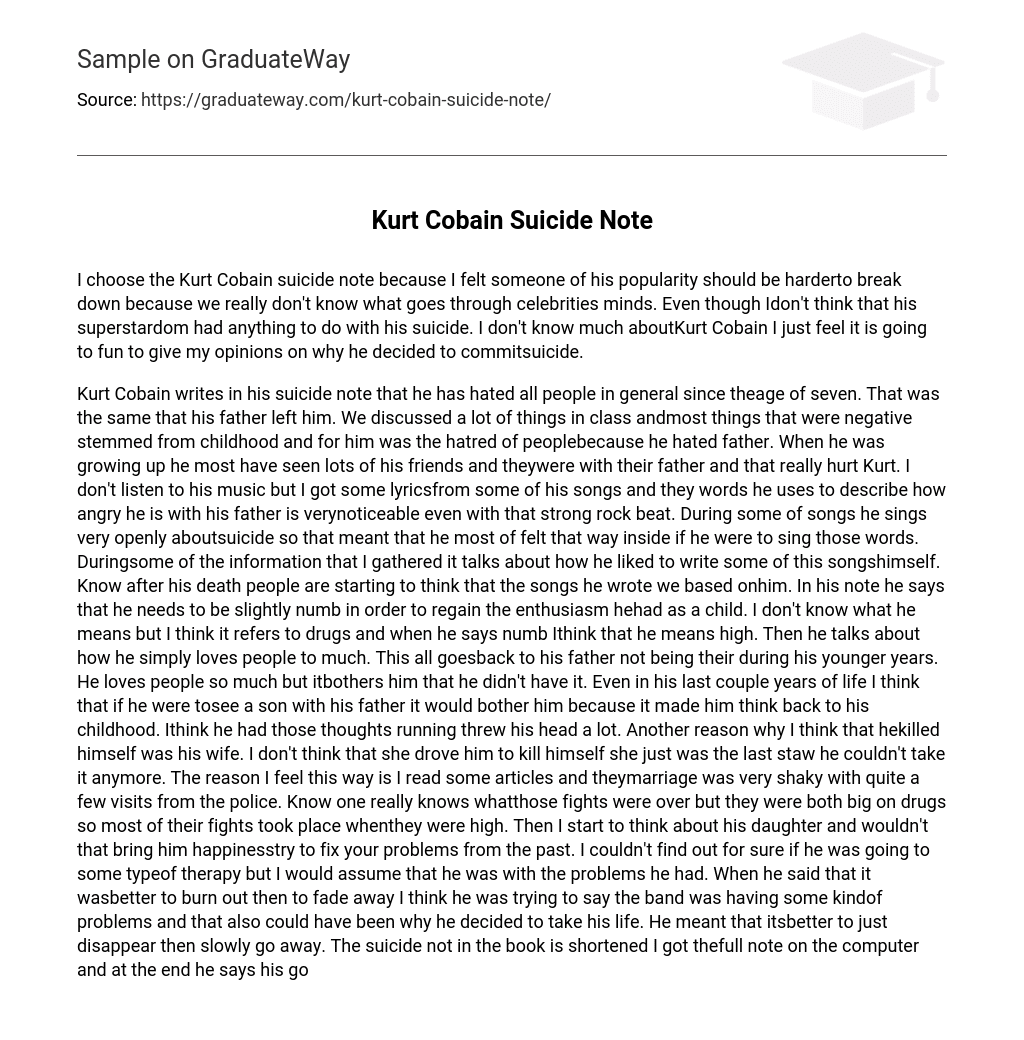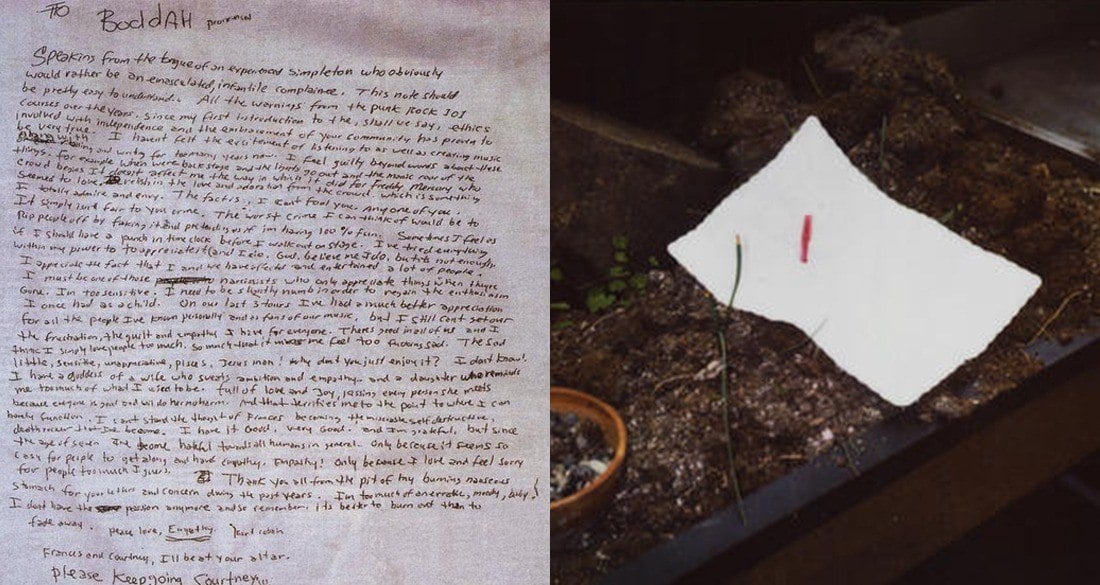Cobain's Suicide Letter: A Heartfelt Dive Into The Legacy Of An Icon
When we talk about Kurt Cobain, we're not just discussing a musician or a rock star. We're talking about a cultural phenomenon, a voice for the disenchanted, and a soul that carried the weight of a generation. Cobain's suicide letter is more than just a document; it's a raw, unfiltered glimpse into the mind of a man who seemed to have it all but still felt lost. If you've ever wondered what led him to write those words or what they truly mean, you're in the right place.
This letter has sparked endless debates, interpretations, and even controversies over the years. Some see it as a cry for help, others as a farewell to a world that didn't understand him. But one thing is certain—it's a powerful reminder of the struggles that come with fame, depression, and the relentless pursuit of authenticity. Let's explore this deeply personal piece of history together.
As we dive into the details, you'll find answers to questions you might have had about Cobain's state of mind, his relationship with fame, and the legacy he left behind. This isn't just a story; it's a journey through the mind of a legend.
Read also:Fluffy Pony Abuse A Deep Dive Into The Dark Side Of Equine Welfare
Who Was Kurt Cobain?
Before we delve into the specifics of Cobain's suicide letter, let's take a moment to understand the man behind the words. Kurt Donald Cobain was born on February 20, 1967, in Aberdeen, Washington. He grew up in a small town, surrounded by music and creativity. His parents' divorce at a young age left a lasting impact on him, shaping his worldview and fueling his artistic expression.
By the early 1990s, Cobain had become the frontman of Nirvana, a band that would go on to redefine rock music. Their album "Nevermind" exploded onto the scene, catapulting them to international stardom. But fame wasn't all it was cracked up to be. Behind the scenes, Cobain struggled with addiction, depression, and the pressure of being a symbol for an entire generation.
Biography and Personal Details
Let's break down some key aspects of Cobain's life through a quick overview:
| Full Name | Kurt Donald Cobain |
|---|---|
| Birthdate | February 20, 1967 |
| Place of Birth | Aberdeen, Washington |
| Occupation | Singer, Songwriter, Guitarist |
| Spouse | Courtney Love |
| Children | Frances Bean Cobain |
Understanding the Context of Cobain's Suicide Letter
Now, let's talk about the elephant in the room—the letter itself. Written on April 5, 1994, Cobain's suicide note is a haunting testament to his inner turmoil. It's a deeply personal message addressed to his imaginary childhood friend, "Boddah," but its themes resonate with anyone who has ever felt lost or misunderstood.
In the letter, Cobain reflects on his life, his career, and his struggles with fame. He talks about the joy he found in making music and the pain of losing himself in the process. It's a raw, unfiltered look at the mind of a man who felt trapped by his own success.
Key Themes in the Letter
Here are some of the main ideas that emerge from Cobain's words:
Read also:Unveiling The Truth Kairazy Real Name And The Story Behind The Spotlight
- Authenticity vs. Fame: Cobain often felt like he was losing himself in the whirlwind of stardom. He wanted to be true to his art, but the demands of the music industry made that difficult.
- Depression and Isolation: Mental health struggles were a constant presence in Cobain's life. The letter reveals just how deeply he felt disconnected from the world around him.
- Love and Legacy: Despite his pain, Cobain expresses love for his family and hopes for a better future for his daughter, Frances Bean Cobain.
Why Did Cobain Write the Letter?
People often wonder what drove Cobain to pen such a heartfelt farewell. The truth is, it wasn't just one thing. His struggles with addiction, depression, and the pressures of fame all played a role. But there's also a sense of inevitability in the letter, as if Cobain had been wrestling with these issues for years and finally reached a breaking point.
Some experts suggest that Cobain's letter was a way of taking control of his narrative. Instead of letting others define his legacy, he chose to speak for himself one last time. It's a powerful reminder of the importance of authenticity, even in the face of overwhelming external pressures.
What Does the Letter Reveal About Cobain's State of Mind?
The letter is filled with clues about Cobain's emotional state in the weeks leading up to his death. He talks about feeling "worn out and emotional," struggling to find joy in the things that once brought him happiness. He also expresses regret over the way his life had turned out, wishing he could have done things differently.
It's important to note that Cobain's struggles were not unique. Many artists and creatives face similar challenges, but few have the courage to articulate them as honestly as he did. His letter serves as a reminder that even the most successful people can feel lost and alone.
The Impact of Cobain's Letter on Popular Culture
Cobain's suicide letter didn't just affect his fans; it had a ripple effect throughout the world of music and beyond. It sparked conversations about mental health, addiction, and the darker side of fame. For many, it was a wake-up call—a reminder that the people we admire are human too, with their own struggles and vulnerabilities.
In the years since Cobain's death, his letter has been studied, analyzed, and even parodied. Some have criticized it for being too self-indulgent, while others see it as a brave act of self-expression. Regardless of your perspective, there's no denying its impact on popular culture.
How Has the Letter Influenced Modern Music?
Many musicians have cited Cobain's letter as a source of inspiration. It's a reminder that art can be a powerful tool for self-expression, even in the darkest moments. Bands like Foo Fighters, Radiohead, and many others have spoken about the influence Cobain had on their work, both musically and personally.
But the letter's influence extends beyond music. It's been referenced in literature, film, and even academia. Scholars have studied it as a case study in celebrity culture, examining the ways in which fame can both elevate and destroy an individual.
Debunking Myths About Cobain's Suicide Letter
Over the years, numerous myths and misconceptions have arisen about Cobain's suicide letter. Some claim it was faked, while others believe it was written under duress. Let's set the record straight:
- Was the Letter Real? Yes, the letter is authentic. It was found alongside Cobain's body and has been verified by multiple sources.
- Was It Written Under Pressure? There's no evidence to suggest that Cobain was coerced into writing the letter. It appears to have been a deeply personal decision.
- Was It a Cry for Help? Some interpret the letter as a cry for help, but it's more accurate to see it as a final statement. Cobain had been struggling with his mental health for years, and the letter reflects that reality.
Why Do Myths Persist?
Myths about Cobain's letter persist because they tap into our need for answers. It's hard to accept that someone as talented and successful as Cobain could feel so lost. By creating alternative narratives, we try to make sense of a tragedy that defies easy explanation.
The Legacy of Kurt Cobain
Despite his untimely death, Cobain's legacy lives on. His music continues to inspire new generations of fans, while his story serves as a cautionary tale about the dangers of fame. But his greatest legacy might be the way he spoke truth to power, both in his music and in his final letter.
Cobain's suicide letter reminds us that even the most successful people can struggle with mental health issues. It's a call to action for all of us to be more compassionate, more understanding, and more willing to listen.
What Can We Learn From Cobain's Story?
Here are a few key takeaways:
- Mental Health Matters: Cobain's struggles highlight the importance of addressing mental health issues early and seeking help when needed.
- Authenticity is Key: In a world obsessed with image and appearances, Cobain's commitment to authenticity stands out as a shining example.
- Love and Legacy: Even in his darkest moments, Cobain expressed love for his family and hope for the future. His letter serves as a reminder of the importance of leaving a positive legacy.
Conclusion: Reflecting on Cobain's Legacy
As we wrap up this exploration of Kurt Cobain's suicide letter, it's worth reflecting on what it means for all of us. Cobain's story is a powerful reminder that success doesn't always equal happiness, and that even the most talented among us can struggle with feelings of isolation and despair.
If you've been moved by Cobain's words, consider taking action. Reach out to someone who might be struggling, share this article with a friend, or simply take a moment to reflect on your own life. Cobain's legacy isn't just about music; it's about empathy, authenticity, and the courage to be vulnerable.
So, what do you think? Do Cobain's words resonate with you? Share your thoughts in the comments below, and don't forget to check out our other articles on music, culture, and mental health. Together, we can keep the conversation going.
Table of Contents
- Who Was Kurt Cobain?
- Understanding the Context of Cobain's Suicide Letter
- Why Did Cobain Write the Letter?
- The Impact of Cobain's Letter on Popular Culture
- Debunking Myths About Cobain's Suicide Letter
- The Legacy of Kurt Cobain
- Conclusion: Reflecting on Cobain's Legacy


